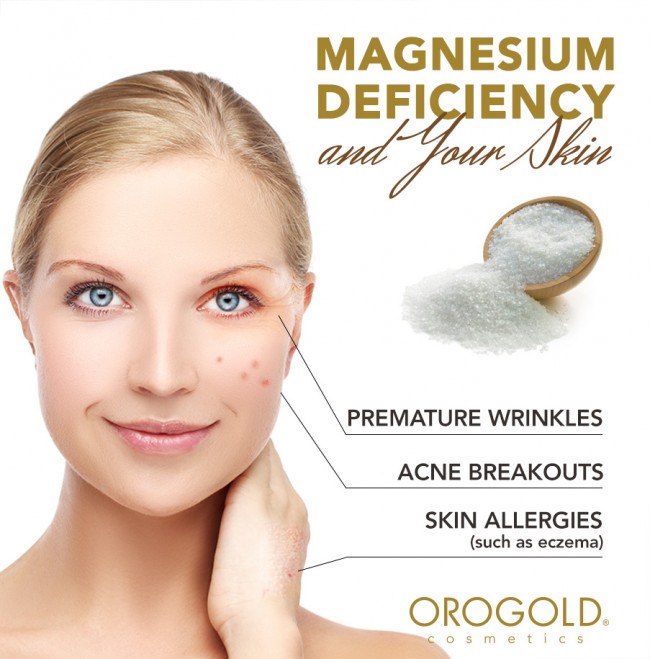Magnesium Deficiency and Your Skin – OROGOLD Reviews

Although the most important and fourth most prevalent mineral in our cells, and needed for over 300 biochemical reactions within the body, many doctors still do not test for magnesium in routine blood tests, meaning that the majority of Americans are magnesium deficient. In addition to helping the body to properly function, preventing osteoporosis, averting heart disease and regulating high blood pressure and diabetes, magnesium also has many benefits when it comes to the skin.
Prevents Wrinkles
The enzymes that replicate and repair the DNA within our body rely on magnesium in order to properly function. Without magnesium, the skin is more exposed to damage and inflammation, and this, combined with the inability of the enzymes in the body to repair damaged DNA, leads to an earlier onslaught of wrinkles and fine lines.
Prevents Skin Allergies
Certain skin conditions, such as eczema, are usually signs of magnesium deficiency. The human body begins producing histamines when the magnesium levels are low, thus creating red blotches and itchy patches on the skin due to leaking fluid from the swelling blood vessels. In addition to the production of histamines, a magnesium deficiency also lowers the levels of fatty acids that are found on the skin. This all results in the loss of elasticity, creating the ideal conditions for dryness and skin allergies.
Reduces Acne Breakouts
When the skin sustains an injury, including the invasion of acne-causing bacteria, a protein is produced that results in an acne breakout. Magnesium has been proven to reduce the effects of the protein, thereby preventing inflammation and reducing the severity of the breakouts.
Natural Magnesium Sources
Magnesium can be found in plenty of natural food sources, such as sea vegetables, dark and leafy greens, including spinach and kale, and whole grains. Other food sources that are high in magnesium are tomatoes, broad beans, artichokes, sweet potatoes, peanuts and milk. Dark chocolate is also rich in magnesium, which is why a common symptom of a magnesium deficiency is a craving for chocolate. Whichever magnesium-rich foods you choose to eat, OROGOLD recommends eating them either raw or steamed, as too much heat can reduce the strength of the magnesium within.
Magnesium Oil
Magnesium oil has only recently become more popular, and isn’t actually an oil. Instead, it is magnesium chloride that is suspended in water, giving it an oily texture. Although it can be expensive to purchase, it is possible to make it at home, by submerging magnesium flakes in hot water and putting it into a spray bottle, which you would use to spritz your face each day. This will help the skin to retain moisture and flexibility, as well as reducing skin conditions that are created by stress, such as rosacea and acne, since stress causes the magnesium stores in the body to begin to deplete.
Since magnesium is needed all over the body, a deficiency can be hard to spot, as there are a huge range of symptoms. If you are worried that you may be deficient in magnesium, OROGOLD recommends that you speak to your doctor about it as soon as possible.

